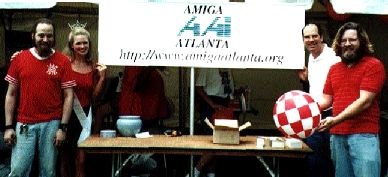|
|
|||||||||||
|
|
|
||||||||||
|
|
|
|
|
|
|
|
|
|
|
|
|
|
|
|
|
Making User Groups Work |
|
|
|
|||||
|
|
|
|
|
|
|
||||||
|
|
|
|
|
|
|
|
|
|
|
|
|
|
|
|
|
|
||||||||
|
|
|
|
|
|
|
|
|
|
|
|
|
|
|
|
When Bill McEwen acquired Amiga from Gateway last year,
he cited his main reason for doing so was the Amiga community. However, that
community would be far less valuable if it weren't for the efforts of user
groups throughout the world. These worldwide user groups accomplished great
things over the last few years, and are a big reason the Amiga continues to
this day. While Amiga user group numbers have fallen, it doesn't
mean that the user group experience has faltered. Some of the ingenious
things Amiga user groups have done have enhanced the Amiga experience into a
tight knit community. User groups filled in the gaps left behind by the
mainstream PC community. For example: Gateway Amiga sponsors an annual Amiga
show in St. Louis. Amiga Atlanta is noted for their charity work with the
Special Olympics. SEAL of the UK puts together a very nice magazine, as do
the French groups AFLE and TRIPLE A. NCAUG has sponsored the blimp-cam and
IRC show coverage. And the international virtual group Team AMIGA is a
veritable customer support group. No other platform has user groups so
involved and so responsible for maintaining a platform's viability. So what does it take to make your user group an enjoyable
experience? Not much actually. It just takes some smart planning and
organization to get things going. You'll find that there are many folks eager
to see the latest software and hardware, get their questions answered, or
shoot the breeze with like-minded people. The good news is that you don't
have to go it alone either. There are many companies, resources, and other
user groups just waiting to lend a helping hand, but first let's cover the
formalities. Amiga user groups vary in size and organization. Some of
the smaller groups have 10 or fewer members while some of the larger groups
(particularly those in Europe) have hundreds of members. Some user groups
have no formal charters in place while others have achieved official
not-for-profit status with their local governments. |
|
||||||||
|
|
|
|
|
|
|
|
|
|
|
|
|
|
|
|
After your group has decided whether to incorporate or
not, and has elected or appointed some key officers (President, Treasurer,
etc.) you will need to find a place to meet and to get the word out. If your
group is small, then any member's home will suffice for a meeting place. This
can be a nice arrangement. Not only will you have access to an Amiga for meeting
topics, you won't have to use the group's funds to rent a room. There should
be various community centers, schools, libraries, offices, and universities
that have rooms to offer for free or for a small fee. |
|
|
|
|
|
|
|
||
|
|
|
|
|
|
|||||||
|
|
|
|
|
|
|
|
|
|
|||
|
|
|
|
|
|
|
|
|
|
|
|
|
|
|
|
Getting the word out about your new user group shouldn't
be hard in this day of the Internet. Setting up a web page and registering it
with some of the many Internet search engines is a big plus. Posting
announcements to Amiga forums and newsgroups is another good way to get the
word out. Many localities have free computer publications like 'Computer
User' that list groups in their area for free. Lastly, many cable companies
and radio stations offer free air time that you can take advantage of to
promote your non-commercial group. With your user group all set up and ready to go, your
next task is to consider the meeting topics and activities your group will
undertake. Not every meeting has to be an elaborate multimedia event, but
some good planning can make for a better experience for all. While hardware and software offerings for the classic
Amiga are a bit thin right now, there are still many releases (commercial and
shareware) that users would be interested in seeing demonstrated at a
meeting. Naturally, when the new Amiga is released, there will be a great
deal of attention placed on new products. Another important area for the Amiga
is networking. Showing how you can network your Amiga to PCs and Macs and
other cross platform topics can help folks find value in using their Amigas.
Presenting tutorials of application software, like Pagestream, ImageFX,
Wordworth, Imagine, Tornado, etc., or showing hands-on how to install a
graphic card or other hardware will certainly keep members interested. Of
course, playing the latest game release is always a good choice for a user
group meeting. Occasional special meetings can also help keep up morale
and attendance. Annual swap meets and cookouts break up the normal routine.
Swap meets can help you drum up some cash as well and lessen the clutter in
your closet, and cookouts are always a crowd pleaser. For example, once a
year members of the National Capital Amiga Users group drive up to Software
Hut in Philadelphia and have a day of food, fun, and special discounts. Many
Amiga dealers are more than happy to participate in these types of user group
events. |
|
||||||||
|
|
|
|
|
|
|
|
|
|
|
|
|
|
|
|
|
|
|
|
|
|
|
|||
|
|
|
|
|
|
|
|
|
|
|
|
|
|
|
|
Anyone who knows Lamar Morgan and the Amiga
Atlanta
user group understands the great work they have done in supporting the
Special Olympics. When IBM dropped their support of the Special Olympics, Mr.
Morgan saw an opportunity to increase the Amiga's exposure for a good
cause. Because of Mr. Morgan's efforts, Amiga is now the exclusive
platform of the Atlanta Special Olympics. This is something most user groups
could accomplish. Mr. Morgan invites all Amiga user groups to see how
they
can participate with their local organizer. If interested, please call Norm
Sterling of the Special Olympics at 770-414-9390 ext. 102 and tell him Lamar
Morgan sent you. But it doesn't end there. Through Amiga Atlanta's hard
work and involvement with the Special Olympics Amiga Sprint will now offer
all Amiga groups in the US fee-free usage of their special long distance
conferencing accounts. Lamar hopes that one day a group of Amiga user groups
link up in a large meeting using this special account. Those interested
should contact Lamar Morgan at 770-209-4011 or go to the Amiga Atlanta
website at http://www.amigaatlanta.org/. With the new Amigas to arrive soon, now is the time to
start planning a new user group or to gear-up your current user group for the
next generation. Until then, there are many things you can do to keep the
fire going at your user meetings. Whether your group joins in a picnic
chatting about Amigas, reviews the latest software, or participates in a
local charity event, your user group experience can still be enjoyable. No matter what size user group you're working with, the
first place you should visit to get information on how to operate a user
group is the User Group Network, or UGN (http://ugn.amiga.org/). The UGN
provides vital information for all Amiga user groups. A search from the
Amiga.org homepage (http://amiga.org/) for user groups you will yield a
complete listing of Amiga user groups worldwide. In addition to the great
info on user groups, you will find a wealth of Amiga knowledge and support
from the Amiga.org website. If you would like Amiga to advertise in your group's
newsletter, or to sponsor a local sports team, contact Kari at mailto:kari@amiga.com.
Amiga would also like to hear suggestions or comments about user group
activities and events at the same address. |
|
||||||||
|
|
|
|
|
|
|
|
|
|
|
|
|
|
|
|
|
|
|
|
|
|
||||
|
|
|
|
|
|
|
|
|
|
|
|
|


